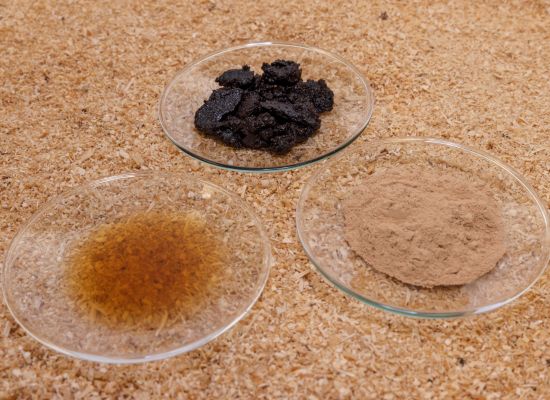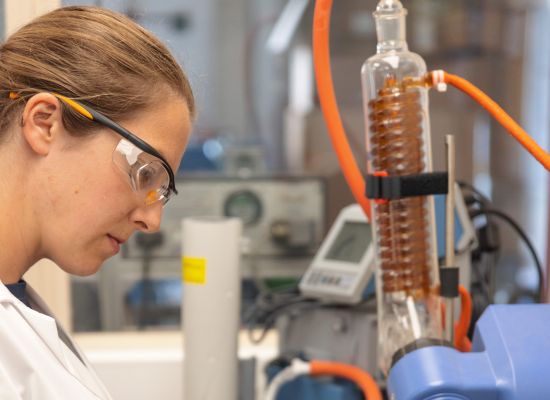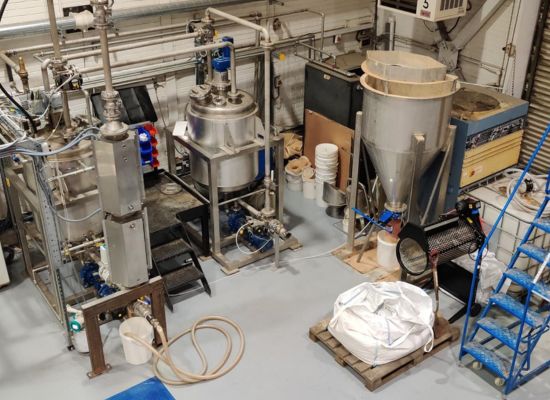Putting Sustainable Chemistry at core of the innovation
The journey of Sonichem began when the founding team came together about 10 years ago and wanted to solve the problem of extracting value from low value agroforestry co-products. They all shared a common vision of Sustainable Chemistry and the belief that the world needed this technology. Miranda Lindsay-Fynn (Commercial Director) studied biological sciences and has led the commercial and marketing departments for various startups and companies in different fields. Dr. Andy West (Chief Chemist) has always been working in the field of Sustainable Chemistry, focused on improving the utilization of waste resources. Adrian Black (CEO) is a serial tech founder and Omar Farooq (Principal Process Engineer) was the latest addition to the team. He has a background in oil and gas processing and is currently helping Bio-Sep to take the technology to the next stage of a full commercial plant. At the beginning of Bio-Sep, founder Stephen Brooks specialised in “sugar chemistry”, he was horrified by the amount of sugar cane bagasse that is burned, because it is considered a low value byproduct. “So, we came up with the concept of finding a way to extract all the bio-chemicals from woody biomass and, thus, prevent any co-products and low value waste products. Sustainable Chemistry was one of our core technological framework values” ”, Miranda explained. The Bio-Sep team focused on finding a low energy, non-toxic and environmentally-friendly solution for their idea that will be at the same time economically sound, and wasn't going to destroy any of the biomass in the process. The team worked with Bath University with this concept in mind and explored different approaches until they started using ultrasound as the energy source. It enables cavitation to break apart the woody biomass into its bio-chemicals using very low energy, low pressures and no toxic acids. Thanks to a grant for the research with universities, Bio-Sep was able to conduct the early R&D for their technology. Then, they won an EU FP7 grant, with a consortium that included two big forestry partners, which financed the build of the pilot plant. Now, the start-up team has 10 members and operates quite a large pilot plant that takes in 50 kilos of sawdust a batch. The pilot plant enabled them to test and optimise the technology for scale up as well as getting decent-sized samples of chemicals into the market.
Sonichem ultrasonic biorefining
What makes the Sonichem innovation unique? As mentioned above, at the beginning, the start-up aimed at using mild organic acids, heat and pressure to break apart the biomass. At the same time, they wanted to make sure that this was not a high carbon impact process and so they examined different energy sources. Hence, they decided to use ultrasound to break apart the chemical bonds because it creates forces called cavitation, which are, essentially, bubbles within the slurry. When they implode, they create such strong physical forces that it pulls apart the bonds holding together the core biomass components without destroying them. No high heat or pressure is needed, which is also much safer to operate. Similar processes, such as steam explosion or organosolv might heat to 200 - 400 degrees centigrade, which is pretty hot and requires a lot of energy! Also, the Sonichem process doesn’t use any corrosive chemicals, because they are harmful for manufacturers and affect the product, too. In addition, they want to ensure that their products can be potentially used in cosmetics, food or pharma. On top of that, Sonichem processes are water-use-neutral as all the water they use in the processes is “recycled”.
“To everything we do, we keep a very close eye on our environmental and economic impact. At each stage of our technology development, we've been using lifecycle or carbon analysis modelling where possible to see where potential impact is,” Miranda stated. Bio-Sep also considers the energy use in their processes, and they are keen that their first plant might be in Scotland where a high proportion of the power is renewable. Another goal for their products is to use them in long lasting materials “locking up” the biogenic carbon, and preventing its release into the atmosphere. Another advantage of the Sonichem process is that the lignin produced, is pure and chemically available. The process produces a resin which is non-sulphonated unlike the majority of lignin produced in other processes. It's very aromatic and has low molecular weight, which means it dissolves readily in commonly available organic solvents including acetone and ethanol. For these reasons, it is of real interest to manufacturers of resins, composites and others. Beyond that, Bio-Sep technology is woody-biomass-agnostic, meaning that they can convert and adapt it to different feedstocks. Bio-Sep is first focused at working with the forestry sector, in the future other feedstocks that they could look at include sugar cane bagasse and palm fronds.
Next steps at Bio-Sep
Currently, Bio-Sep is operating their pilot plant and preparing their technology for scale-up. Their process engineer is designing the first-of-a-kind commercial plant which will have a capacity of up to 20,000 tons a year. Their goal is to have the first commercial plant being built within the next 24 months. The plant will be revenue generating and can be used to demonstrate the technology to other sawmill operators, other agricultural producers as well as chemical companies, for licencing opportunities. In the long-term, they hope to roll out globally through a mixed model of joint venture operations and licencing.s. Whilst the start-up is currently working with sawdust from spruce, they are testing other feedstocks and are attracting interest from other farmers and collectives in the UK who want to use oat husks or grasses, for example.
With their innovative approach, Bio-Sep who joined the ISC3 Global Start-up Service in November 2022, is actively contributing to SDG 9 (industry, innovation and infrastructure), SDG 11 (sustainable cities and communities), SDG 12 (responsible production and consumption) and SDG 13 (climate action).




